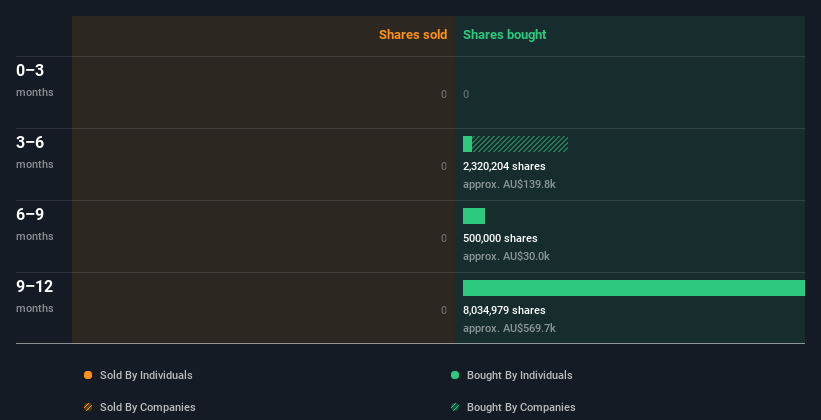Reversal Of Fortune For QuickFee Insiders Who Made A AU$1.0m Purchase
Some of the losses seen by insiders who purchased AU$1.0m worth of QuickFee Limited (ASX:QFE) shares over the past year were recovered after the stock increased by 21% over the past week. However, total losses seen by insiders are still AU$498k since the time of purchase.
Although we don't think shareholders should simply follow insider transactions, logic dictates you should pay some attention to whether insiders are buying or selling shares.
Check out our latest analysis for QuickFee
QuickFee Insider Transactions Over The Last Year
In the last twelve months, the biggest single purchase by an insider was when insider Kenneth Gray bought AU$591k worth of shares at a price of AU$0.37 per share. So it's clear an insider wanted to buy, even at a higher price than the current share price (being AU$0.063). Their view may have changed since then, but at least it shows they felt optimistic at the time. We always take careful note of the price insiders pay when purchasing shares. Generally speaking, it catches our eye when insiders have purchased shares at above current prices, as it suggests they believed the shares were worth buying, even at a higher price.
QuickFee insiders may have bought shares in the last year, but they didn't sell any. Their average price was about AU$0.12. I'd consider this a positive as it suggests insiders see value at around the current price. You can see a visual depiction of insider transactions (by companies and individuals) over the last 12 months, below. By clicking on the graph below, you can see the precise details of each insider transaction!
There are plenty of other companies that have insiders buying up shares. You probably do not want to miss this free list of growing companies that insiders are buying.
Insider Ownership Of QuickFee
Many investors like to check how much of a company is owned by insiders. Usually, the higher the insider ownership, the more likely it is that insiders will be incentivised to build the company for the long term. It appears that QuickFee insiders own 31% of the company, worth about AU$5.4m. This level of insider ownership is good but just short of being particularly stand-out. It certainly does suggest a reasonable degree of alignment.
So What Does This Data Suggest About QuickFee Insiders?
The fact that there have been no QuickFee insider transactions recently certainly doesn't bother us. But insiders have shown more of an appetite for the stock, over the last year. Insiders own shares in QuickFee and we see no evidence to suggest they are worried about the future. So while it's helpful to know what insiders are doing in terms of buying or selling, it's also helpful to know the risks that a particular company is facing. For example, QuickFee has 5 warning signs (and 2 which are concerning) we think you should know about.
If you would prefer to check out another company -- one with potentially superior financials -- then do not miss this free list of interesting companies, that have HIGH return on equity and low debt.
For the purposes of this article, insiders are those individuals who report their transactions to the relevant regulatory body. We currently account for open market transactions and private dispositions of direct interests only, but not derivative transactions or indirect interests.
Have feedback on this article? Concerned about the content? Get in touch with us directly. Alternatively, email editorial-team (at) simplywallst.com.
This article by Simply Wall St is general in nature. We provide commentary based on historical data and analyst forecasts only using an unbiased methodology and our articles are not intended to be financial advice. It does not constitute a recommendation to buy or sell any stock, and does not take account of your objectives, or your financial situation. We aim to bring you long-term focused analysis driven by fundamental data. Note that our analysis may not factor in the latest price-sensitive company announcements or qualitative material. Simply Wall St has no position in any stocks mentioned.

 Yahoo Finance
Yahoo Finance 
